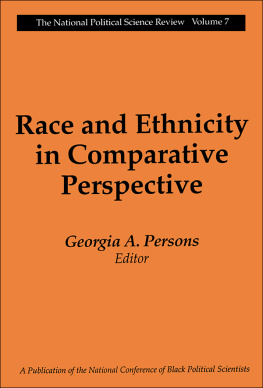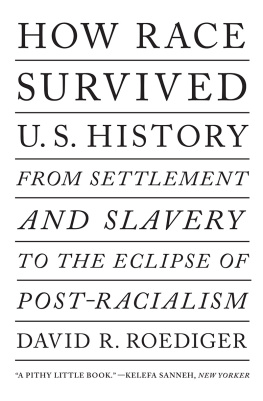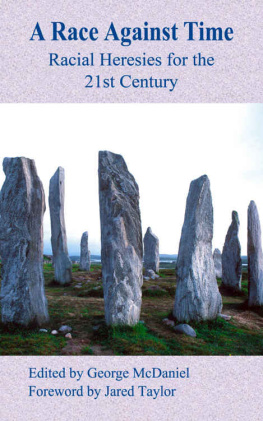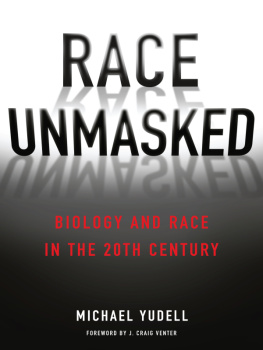CULTIVATING RACE
NEW DIRECTIONS IN SOUTHERN HISTORY
SERIES EDITORS
Michele Gillespie, Wake Forest University
William A. Link, University of Florida
The Lost State of Franklin: Americas First Secession
Kevin T. Barksdale
Bluecoats and Tar Heels: Soldiers and Civilians in Reconstruction North Carolina
Mark L. Bradley
Becoming Bourgeois: Merchant Culture in the South, 18201865
Frank J. Byrne
Cowboy Conservatism: Texas and the Rise of the Modern Right
Sean P. Cunningham
Raising Racists: The Socialization of White Children in the Jim Crow South
Kristina DuRocher
A Tour of Reconstruction: Anna Dickinsons Travel Letters from 1875
edited by J. Matthew Gallman
Lum and Abner: Rural America and the Golden Age of Radio
Randal L. Hall
The New Southern University: Academic Freedom and Liberalism at UNC
Charles J. Holden
Entangled by White Supremacy: Reform in World War Iera South Carolina
Janet G. Hudson
Cultivating Race: The Expansion of Slavery in Georgia, 17501860
Watson W. Jennison
The View from the Ground: Experiences of Civil War Soldiers
edited by Aaron Sheehan-Dean
Reconstructing Appalachia: The Civil Wars Aftermath
edited by Andrew L. Slap
Blood in the Hills: A History of Violence in Appalachia
edited by Bruce E. Stewart
Moonshiners and Prohibitionists: The Battle over Alcohol in Southern Appalachia
Bruce E. Stewart
Southern Farmers and Their Stories: Memory and Meaning in Oral History
Melissa Walker
Law and Society in the South: A History of North Carolina Court Cases
John W. Wertheimer
Cultivating Race
The Expansion of
Slavery in Georgia,
17501860
WATSON W. JENNISON
Copyright 2012 by The University Press of Kentucky
Scholarly publisher for the Commonwealth, serving Bellarmine University, Berea College, Centre College of Kentucky, Eastern Kentucky University, The Filson Historical Society, Georgetown College, Kentucky Historical Society, Kentucky State University, Morehead State University, Murray State University, Northern Kentucky University, Transylvania University, University of Kentucky, University of Louisville, and Western Kentucky University.
All rights reserved.
Editorial and Sales Offices: The University Press of Kentucky
663 South Limestone Street, Lexington, Kentucky 40508-4008
www.kentuckypress.com
16 15 14 13 12 5 4 3 2 1
Maps by Dick Gilbreath, University of Kentucky Cartography Lab
Cataloging-in-Publication data is available from the Library of Congress.
ISBN 978-0-8131-3426-0 (hardcover : alk. paper)
ISBN 978-0-8131-3446-8 (ebook)
This book is printed on acid-free paper meeting the requirements of the American National Standard for Permanence in Paper for Printed Library Materials.
Manufactured in the United States of America.
| Member of the Association of
American University Presses |
To Puck and Sue,
For all that youve done and continue to do
CONTENTS
ACKNOWLEDGMENTS
For more than a decade, Georgia, as Ray Charles memorably sang, has been on my mind. Hardly a day has passed during that time when I did not consider some aspect of the states rich history. Indeed, Georgia has been on my mind, in my head, and, occasionally, even in my dreams. In writing the monograph that resulted from this mild obsession, I incurred countless debts along the way. Consequently, I am grateful to a range of people whose support and contributions helped make this book possible.
Id like to thank the folks at the University Press of Kentucky, especially Anne Dean Watkins, for bringing Cultivating Race to print. Dick Gilbreath also deserves special thanks for his many maps, which add an important dimension to the book. In addition, Id like to express my appreciation to the series editors, Michele Gillespie, Bill Link, and Peter Carmichael, whose advice proved invaluable. Michele helped me in innumerable ways. Beyond my heavy reliance on her scholarship on Georgia, I benefited from Micheles sage advice. Michele read multiple drafts of the manuscript and offered several key suggestions, each of which I strove to implement; I have no doubt that her words of wisdom greatly improved the end product. Like Michele, Bill played an outsized role in the effort to bring this manuscript to publication. His counsel helped me navigate the sometimes rocky shoals of the academy and the publishing world. His guidance has been valuable, but I have benefited even more from his friendship.
While conducting research for this project, I visited numerous libraries and archives and benefited in myriad ways, both from the documents I viewed and from my interactions with the people who keep these institutions running. Id like to thank the staff at the Georgia Archives (formerly the Georgia Department of Archives and History), the Georgia Historical Society, Alderman Library at the University of Virginia, Wilson Library at the University of North Carolina at Chapel Hill, Perkins Library at Duke University, P. K. Yonge Library at the University of Florida, and Hargrett Library at the University of Georgia. I would especially like to thank the Woodruff Library at Emory University for a generous research grant. I am also indebted to the staff in the interlibrary loan offices at Jackson Library at the University of North Carolina, Greensboro, and Alderman Library, whose prodigious efforts facilitated my search for sources on Georgia and whose resourcefulness always astounded me.
My years in Charlottesville were some of the best of my life. During that time, my intellectual universe expanded exponentially thanks to the faculty in the history department at the University of Virginia. A particularly loud shout-out goes to Edward Ayers, my advisor and good friend, for his part in this transformation. As a role model, he has few equals. His dedication to his students and his craft left a lasting impression on me, one that I can only aspire to emulate. His guidance deepened my understanding of southern history and all its contradictions and complexity. Courses with Grace Hale, Joseph Miller, Richard Drayton, Peter Onuf, Dylan Penningroth, Nelson Lichtenstein, and George Mentore broadened my historical perspectives and played an instrumental role in my development as a scholar. I benefited from the friendship and advice of Carl Bon Tempo, Aaron Sheehan-Dean, Andy Lewis, Phil Troutman, Li Fang, Charles Irons, Amy Murrell Taylor, and Syed Ali. I will always remember and value my late night gab sessions with John Riedl and Josh Rothman. While in graduate school I had the good fortune to find employment at the Virginia Center for Digital Humanities, where I worked on the Valley of the Shadow Project. I would like to thank Ed Ayers and Will Thomas for that valuable opportunity. I would also like to thank Reginald Butler and Scot French for hiring me for a summertime stint at the Carter G. Woodson Center at a time when I was deeply in need of a job.










